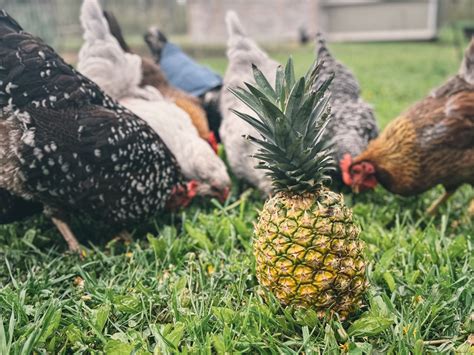Chickens are fascinating creatures, and as a responsible chicken owner, it's essential to ensure they receive a balanced and nutritious diet. While chickens can eat a variety of fruits and vegetables, it's crucial to understand what human foods are safe for them to consume. In this article, we'll delve into the world of pineapple and explore whether it's a suitable treat for your feathered friends.
The Importance of a Balanced Diet for Chickens
Before we dive into the world of pineapple, it's essential to understand the importance of a balanced diet for chickens. A well-balanced diet should include a mix of grains, proteins, fruits, and vegetables. Chickens require a diet rich in calcium, phosphorus, and protein to maintain strong bones, healthy feathers, and optimal egg production.
A typical chicken diet consists of:
- Laying pellets or crumbles (50-60% of their diet)
- Fresh fruits and vegetables (10-20% of their diet)
- Grains (10-20% of their diet)
- Protein sources (5-10% of their diet)
Can Chickens Eat Pineapple?
Now that we've established the importance of a balanced diet, let's explore whether pineapple is a safe and healthy treat for chickens.
In moderation, pineapple can be a nutritious and delicious treat for chickens. Pineapple is an excellent source of:
- Vitamin C: essential for immune function and overall health
- Manganese: crucial for bone health and egg production
- Fiber: helps maintain a healthy digestive system
However, it's essential to note that pineapple should not make up a significant portion of your chicken's diet. A balanced diet should always be the primary source of nutrition, and treats like pineapple should be limited to 5-10% of their daily intake.
How to Feed Pineapple to Chickens
If you decide to feed pineapple to your chickens, make sure to follow these guidelines:
- Remove the skin and core: The skin and core of pineapple can be difficult for chickens to digest, so it's best to remove them before feeding.
- Cut into small pieces: Cut the pineapple into small, bite-sized pieces to prevent choking hazards.
- Feed in moderation: Limit pineapple to 5-10% of their daily intake to avoid upsetting their digestive system.
- Avoid canned pineapple: Canned pineapple is often high in sugar and preservatives, which can be detrimental to your chicken's health.

Potential Risks of Feeding Pineapple to Chickens
While pineapple can be a nutritious treat for chickens, there are some potential risks to consider:
- Digestive issues: Some chickens may experience digestive issues, such as diarrhea or stomach upset, if they eat too much pineapple.
- Sugar content: Pineapple is relatively high in sugar, which can lead to weight gain and other health problems if fed excessively.
- Allergies: Some chickens may be allergic to pineapple, so it's essential to monitor their behavior and health after introducing it into their diet.
Alternatives to Pineapple for Chickens
If you're concerned about the potential risks of feeding pineapple to your chickens or simply want to provide a varied diet, consider these alternatives:
- Apples: A crunchy and nutritious treat rich in fiber and antioxidants.
- Carrots: A sweet and crunchy snack rich in vitamin A and fiber.
- Sweet potatoes: A nutrient-rich treat high in fiber, vitamins, and minerals.

Gallery of Chicken-Friendly Fruits and Vegetables






FAQs
Can chickens eat pineapple cores?
+No, it's best to remove the pineapple core before feeding it to your chickens. The core can be difficult to digest and may cause digestive issues.
How much pineapple can I feed my chickens?
+Limit pineapple to 5-10% of your chicken's daily intake. Overfeeding can lead to digestive issues and other health problems.
Can I feed pineapple to my chickens every day?
+No, it's best to vary your chicken's diet and not feed pineapple every day. A balanced diet should include a mix of grains, proteins, fruits, and vegetables.
Conclusion
In conclusion, pineapple can be a nutritious and delicious treat for chickens in moderation. However, it's essential to remove the skin and core, cut it into small pieces, and feed it in limited quantities. Remember to provide a balanced diet and vary your chicken's treats to ensure they receive a broad range of nutrients. Happy chicken keeping!
